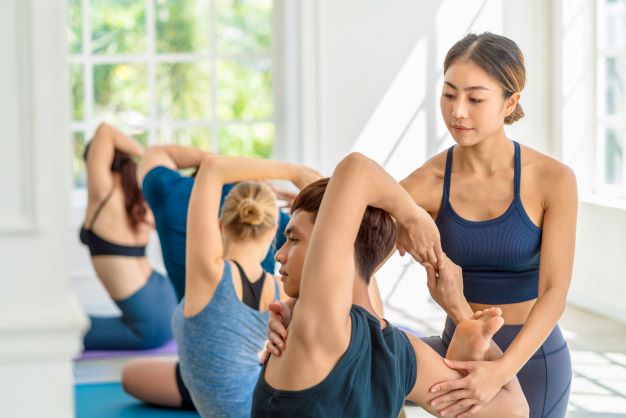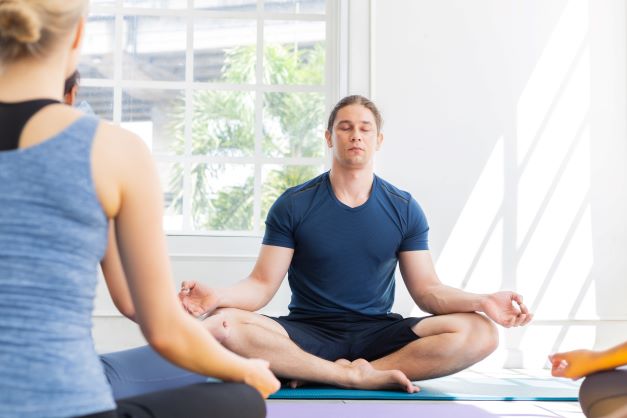Is Learning Yoga a Skill?

Yoga is a ancient system of principles, philosophies and practices that encourage the union between the mind, body and breath. This can lead to inner peace and greater self-awareness.
Yoga is a great way to relieve stress and promote health. It involves postures, breathing exercises and relaxation.
- Patience
A key part of learning yoga is patience. It is a skill you must master and will help you build strong, healthy relationships with your family and friends.
Meditation and yoga are great ways to develop patience. These activities can help you deal with difficult situations at home and at work.
Another way to build your patience is by taking the time to observe your reactions. If you get impatient when someone doesn’t pay attention to you or your needs, take a break.
Practicing patience can also be helpful when you’re dealing with people who have a difficult temper or who can’t wait to get their own way. Rather than feeling frustrated, try to see their behavior as a teaching moment that will help you become a better partner or boss.
Patience is essential in all situations, but it is especially important during times of stress. This is because it helps you manage your emotions and see the bigger context.
It’s also a skill that can help you make better decisions. You can choose the right exercise program or the best medication by being patient. This will help you avoid making hasty decisions and choosing something that has long-term advantages.
It can be difficult to develop patience at times. But it is worth the effort. It will help you cope with difficult situations and find hope even in the most difficult of times. It will also help you live more fully and appreciate the beauty of your lives.
- Flexibility
Flexibility is crucial for many physical fitness goals. It can help you avoid injury and pain. It can also help you feel more connected to your body.
Stretching can improve flexibility. Yoga is the best way. A good yoga teacher will teach you the safest ways to improve flexibility and how to use props to safely extend your range of motion.
While yoga can be very effective when you focus on flexibility, it is important to listen to the body and avoid over-stretching. Unlike other forms of exercise, you don’t want to overdo flexibility training and risk injury or damage your joints.
A dedicated yoga practice can improve flexibility and keep it in great shape for many decades to come. Research has shown that yoga-practicing seniors have a slower rate for flexibility loss than those who don’t.
Additionally, flexibility can help you avoid back and joint pain, sports injury, repetitive-use injuries, and sports injuries. It can also improve your balance by allowing your muscles to withstand greater strain and correcting imbalances.
Finally, flexibility increases your mental health by reducing stress. Flexibility is key to stress management as it helps you adapt to and handle stressful situations.
There are many styles of yoga that can help improve flexibility. Vinyasa, hatha, are the most well-known. Both of these yoga styles combine stretching and strength exercises with breathing techniques, meditation, and philosophy. They can be either very intense or very relaxing depending on your preference.
- Active Listening
Active listening is an essential skill in yoga. Active listening involves paying attention to the speaker’s words and listening for their emotions. It also involves paying attention to nonverbal cues, such as tone of voice, facial expressions, and body language.
You can encourage your partner’s feelings and thoughts by being a good listener. This can help you understand their point of view, which can lead to productive discussions.
Another important part of active listening is avoiding judgmental or critical comments. It’s often easy to make assumptions about the other person’s opinions and emotions, especially when you’re not familiar with their background or context.
It is possible to practice empathy by listening and asking thoughtful questions. This will help you build trust and empathy for them, which can contribute to better relationships with them in the future.
As a result, your communication skills will improve with coworkers and other people. You’ll also learn how to be more effective in a variety of roles, including as a spouse, friend, colleague, mentor, or coach.
Active listening can improve your relationship with another person as well as your mental and emotional health. It helps you to remain focused and calm, which can lower your stress level and improve the quality of your life.

Although active listening can be difficult to master, it can be very rewarding. You’ll be able to communicate more effectively, get your point across, and resolve conflicts more quickly. You might also discover new perspectives and ideas.
- Self-Control
As you may already know, yoga is a form of meditation that combines physical poses, controlled breathing and relaxation. It is an excellent exercise that can improve your quality of life, reduce stress and lower blood pressure.
Learning yoga is not a simple task, and it requires discipline. It also teaches you to practice patience and focus on the process, rather than on the outcome.
Self-control is a vital skill for children to learn, and practicing yoga helps them to develop it. Research shows that children who practice yoga regularly are more able to deal with stressful situations.
In addition to developing self-control, yoga also helps children increase their emotional awareness and self-compassion. This is an important part of growing up, and can help children become more compassionate and understanding.
This can be difficult, especially for children who are sensitive or have anxiety disorders. However, practicing yoga can help to ease this by allowing them to relax and focus on the present.
Yoga classes for children often include animal-like poses that encourage self-confidence and help to improve their awareness of their bodies’ midline. These poses are great for improving self-esteem and focus. They also help build strength in the neck and shoulder muscles.
In a study of elementary school children, learning yoga helped them to develop self-regulation skills. It helped them to be calm in stressful situations. This was also associated with a decrease in teacher-rated submissive venting, and total behavior problems.
- Stress Management
It is essential to learn how stress can be managed if you want the most out your yoga practice. It can help improve your ability to focus on the present moment, and decrease your tendency to dwell on negative thoughts that can lead you to anxiety or depression.
There are many ways to reduce stress. But, the most important thing is your breath. Breathing exercises can help reduce stress and improve your immune system.
Meditation is another way you can reduce stress. Meditation can help reduce anxiety and increase happiness. You can learn to meditate on a regular basis through a variety of techniques, including sitting meditation and mindfulness meditation.
Meditation is a great way to unwind and relax, regardless of where you are located or what equipment you have. It can be a great way for you to relax and unwind after a long day.
Stress is a common problem that affects people from all walks of life and can have serious health consequences. Stress can increase your risk of heart disease, strokes and depression, as well as suicide.
You can reduce your stress by simply practicing yoga regularly. It can also help to be more aware about how your body reacts when you are exposed to stressors.
A lot of the stress relief benefits you see in yoga are related to a reduction of the sympathetic nervous system, which is responsible for the fight-or-flight response. Yoga trains your parasympathetic nervous systems to counteract the stress response.
Yoga can help you reduce stress and loneliness. This is something many people struggle with. It can also help you to connect with others and learn new skills. It can help you be more patient and listen to your body. This skill is invaluable for anyone suffering from stress.




